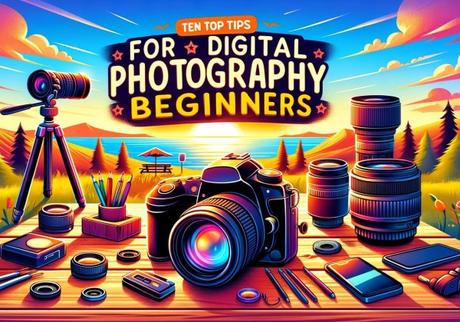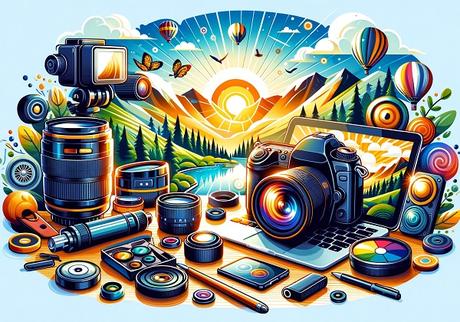
In the ever-evolving world of digital photography, where every moment can be captured and every memory immortalised, stepping into the role of a photographer can be as thrilling as it is daunting. Whether you’ve just unboxed your first camera or are venturing out with your smartphone’s camera, the journey to capturing breathtaking images has endless possibilities and learning opportunities. This article is designed to be your trusty guide, unveiling ten essential tips that every beginner photographer should know. From mastering the art of composition to understanding the delicate dance of lighting, these tips are your first steps into digital photography’s vast and vibrant world. So, charge your batteries, clear your memory cards, and prepare to embark on a journey that promises to transform the way you see and capture the world around you.
Change Your Vantage Point
Often, we take photos from our eye level because it’s natural. Challenge yourself to explore different vantage points. Crouch low, climb high or just tilt your camera to find a new perspective. Each position offers a unique way of viewing the world.
Understanding Your Equipment
The first step in your photography journey is getting to know your camera. Digital cameras come in various shapes and sizes, with different features suited for diverse photography styles. Start with a basic model that allows you to explore fundamental features. Understanding the camera’s capabilities and limitations will help you make the most of your equipment.
Mastering the Basics of Composition
A well-composed photograph is powerful. Learn the Rule of Thirds, a composition principle that suggests dividing the image using two horizontal and two vertical lines. Place your subject along these lines or their intersections for a balanced composition. Also, experiment with techniques like leading lines, symmetry, and framing to create visually appealing images.
Learning About Exposure
Exposure is crucial in photography. It’s a combination of ISO (the camera’s sensitivity to light), Shutter Speed (how long the shutter stays open), and Aperture (the size of the lens opening). Balancing these elements is key to capturing images that are neither dark nor bright. Understanding this Exposure Triangle is foundational in mastering photography.
The Importance of Lighting
Light is a photographer’s best friend. Natural light, particularly during the golden hours of early morning or late afternoon, can produce stunning photographs with soft shadows and highlights. Learning about artificial lighting setups is essential if you’re shooting indoors or at night. Even a simple flash can significantly improve your photos.

Experimenting with Different Perspectives
Photography is an art; like any art form, it thrives on creativity. Don’t hesitate to experiment with different angles and perspectives. Sometimes, a bird’s-eye view or a worm’s-eye view can turn an ordinary scene into an extraordinary photograph. Changing your perspective can also change the story you’re telling through your lens.
Post-Processing Basics
Post-processing can transform good photos into great ones. Familiarize yourself with basic photo editing software. Simple adjustments like cropping, brightness and contrast, or filters can enhance your images. Remember, the goal of editing should be to complement, not overshadow, the natural beauty of your shot.
The Art of Being Patient and Observant
Great photography often requires patience. Wait for the right moment. Sometimes, this means observing your surroundings and anticipating action or changes in light. Patience can lead to capturing a moment that’s both rare and beautiful.
Joining Photography Communities and Seeking Feedback
No photographer is an island. Joining a community, whether online or in-person, can accelerate your learning. Share your work, ask for feedback, and engage with the work of others. Constructive criticism is invaluable for improvement.
Practicing Regularly and Setting Goals
Photography is a skill honed over time. Set achievable goals, like mastering a new technique or participating in a photo challenge. Practice in various settings – from busy streets to tranquil nature – to build versatility.
In this journey of becoming a photographer, each tip you’ve read here is a stepping stone to mastery. Remember to enjoy every step, every click, and every image you capture. Photography is not just about the end result but also about the joy and learning in the process.
Are you ready to embark on your photography adventure? Grab your camera and start exploring the world through your lens. Share your progress and stories with us by tagging [Your Blog or Social Media Handle] in your photos. We can’t wait to see the world through your eyes. Happy shooting!

